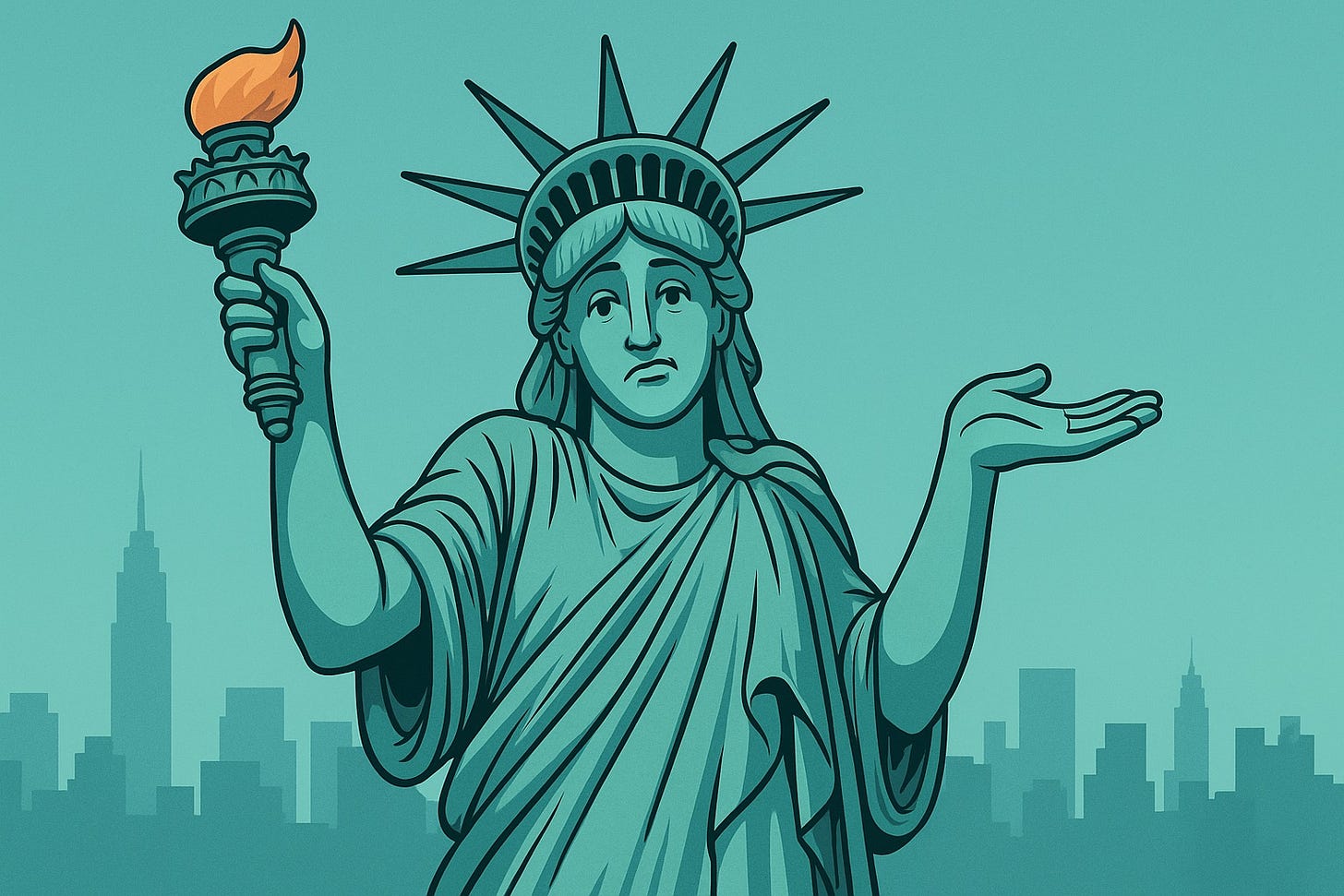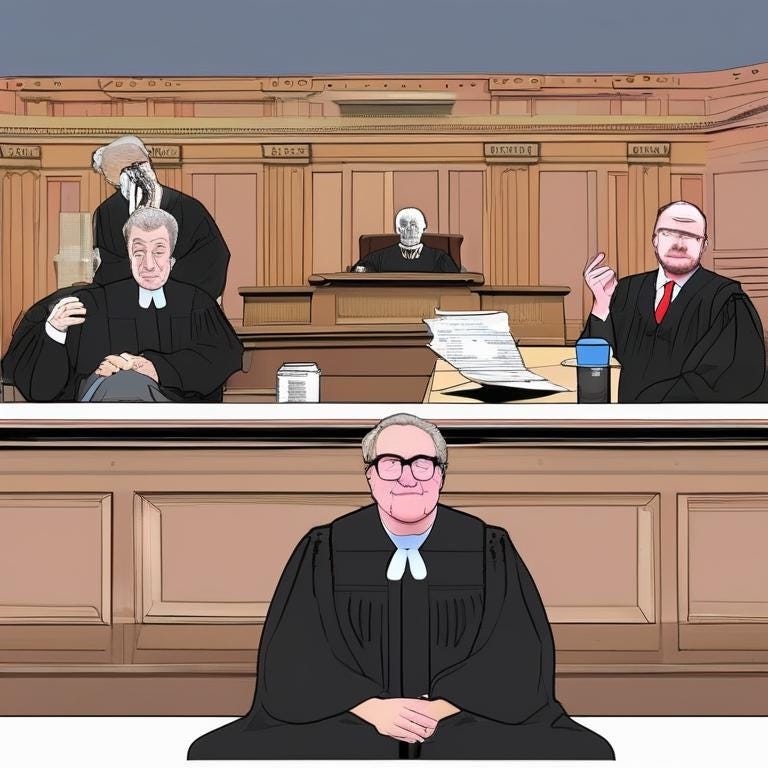Liberty Shrugged: A Two-Handed Mugging
Welcome to the Republic of Hurt Feelings, where social cancellation is the new black. Your neighbors are the new sheriffs in town, armed with blacklists and open letters.
Forget prisons, the real punishment is a barren calendar and a career that’s MIA by lunchtime. Censorship? Who needs it when you have cancel culture on speed dial!
America, land of the free-ish. The First Amendment turns 234 and looks terrific, for a document kept in glass and ignored on weeknights. On the left, free speech is being strangled by hashtags and HR memos. On the right (or rather, on the people currently holding the big shiny keys), it’s being lovingly “protected” with executive orders, funding conditions, and regulator love letters that smell faintly of bleach. Across the pond, Britain - proud owner of no First Amendment whatsoever - has discovered the joys of kinder, gentler muzzles. Everywhere you look, Liberty hasn’t so much shrugged as rolled her eyes and checked the exit.
Side One: The Republic of Hurt Feelings
The left’s case starts with social cancellation. Not the government - your neighbours. The blacklists, the “open letters,” the public square where a thousand voices bloom and half of them demand you be fired by lunchtime. The punishment isn’t a prison, it’s a calendar, no bookings, no platform, no career. “It’s not censorship,” we’re told, “it’s consequences.” Yes. And if I drop a piano off a balcony, it’s gravity.
Then we glide from social pressure to state pressure: the jawboning era, when officials “politely” nudge platforms to make “responsible choices” about COVID skepticism, election chatter, whatever’s impolite at tea. The Supreme Court did its best impression of a cat avoiding eye contact - standing, shmanding - declining to rule on the core question of government leaning on private megaphones. Translation: the line between advice and threat remains a tasteful blur. Meanwhile, another case warned regulators you can’t whisper “nice bank you’ve got there, shame if it… reputationally suffered” and call it civic hygiene. Everyone nodded gravely; everyone keeps doing it.
And hovering over all of it is the strange metaphysics of platforms. Are they the phone company (must carry everything), or are they editors (can pick and choose)? If an algorithm curates, recommends, and demotes like a newsroom, it starts to look suspiciously like speech of its own - at which point state “neutrality” mandates look like the government wearing your editorial hat. The left’s kicker: culture cancels first, government arrives later with a clipboard and a grin.
Side Two: The Ministry of Nice
Now flip the board. Today’s administration - branded as anti-“woke” but frankly just pro-lever - has discovered the thrill of direct influence. Not a nudge. A knob.
DEI? Off with its head. An executive order on day one, then a cascade of agency memos telling universities and grantees to tidy up the ideology or tidy up their budgets. A judge just had to remind Washington that “arbitrary and capricious” is not a management style, restoring a mountain of frozen research money after a university found itself caught between yesterday’s rules and today’s vibe.
Media? The regulators approved a mega-merger and sprinkled on conditions like Parmesan: no formal DEI schemes, promise “unbiased” news, hire a hall monitor for the newsroom. If you need an ombudsman because the state says so, the state is too close to the copy desk. Elsewhere, a late-night comic disappeared, reappeared, and picked up a few new scars from affiliates and a federal eyebrow raise - just long enough for everyone to claim victory and learn nothing.
Call it the new etiquette: we don’t censor. We just make compliance conditions exquisitely clear. You can say anything you like, provided the people who control your licences, grants, securities, and spectrum don’t feel you’re saying it too loudly, too strangely, or in the wrong outfit. The old rule was “Congress shall make no law.” The new rule is “Agencies shall make a spreadsheet.”
The Bipartisan Con
Both sides swear they’re defending the First Amendment. Both have dirty hands. The left despises cancellation until it’s their boycott; the right hates jawboning until it’s their “safety team call.” One team wants platforms to carry everything except the things they don’t like; the other wants platforms to remove everything except the things they do. They’re not opposites. They’re competitors selling the same product: Your Speech, Curated By Us.
Meanwhile, in the UK: The Velvet Rope
Britain doesn’t do a written First Amendment. We do the vibe of one. We prefer polite paperwork to dramatic bans. It’s quieter that way.
The Online Safety Act deputises platforms to tidy the internet, with Ofcom writing codes that turn “be careful” into “be careful or else.” The goal is illegal content and harms; the effect is flood-the-zone risk aversion. If you run a platform, you won’t wait for a court to tell you what crosses a line - you’ll move the line to your safest lawyer’s inbox.
The Public Order Act gifts police new toys against “serious disruption.” Translation: if your protest works, it’s suspicious. “Locking-on” to things is now a crime; feel free to hold beliefs, but please do so without fastening them to anything sturdy.
The Higher Education (Freedom of Speech) Act orders universities to promote free speech via… new bureaucracy. Only Britain could laminate liberty. Want to invite a speaker? Fill out Forms A through Z so that freedom may be scheduled, risk-assessed, and, if necessary, postponed for your own good.
And for dessert, investigatory powers keep expanding like a well-fed cat, with begrudging carve-outs for journalism after the courts glower. “We respect source confidentiality” (subject to a subclause, a ministerial certificate, and the phase of the moon).
Britain’s trick is simple: we never admit to censorship; we enforce tidiness . Say what you like, but not here, not now, not like that, and certainly not if it causes a fuss.
How to Tell You’re Being Managed
The people in charge insist they’re “depoliticising” something.
A regulator uses the word “expectations” in a sentence with “licence.”
A university discovers that free speech is free, provided it files monthly.
Your favourite show goes “on a brief hiatus” and returns with a new segment called “Both Sides, But Softer.”
Everyone says it’s not censorship - it’s safety, standards, stakeholder confidence, or just good business .
A Modest Survival Guide
Learn the difference between being disliked and being disallowed. One is part of adulthood; the other is a constitutional problem.
Stop outsourcing your outrage. If an algorithm is your editor-in-chief, don’t be shocked when your front page looks like a dopamine lab.
Defend speech you don’t need. The only kind you’ll notice missing is the kind you never use.
Beware of “conditions.” Today it’s a DEI policy; tomorrow it’s a “neutrality” pledge; the day after, it’s a promise to keep jokes “appropriate for families.”
Keep receipts. Tyranny in liberal clothes travels by memo.
The punchline? We keep pretending the danger is “the other side,” when the danger is power with a preference. Your enemies will silence you because they hate you. Your friends will silence you because they love you. The result is the same: quieter citizens, louder state.
So yes, Liberty has shrugged. She’s also packed a weekend bag. If you need her, she’s out walking, no phone, no ombudsman, no permit, saying troublesome things at a reasonable volume before someone decides the volume is the problem.
Keep up to date with The Letts Journal’s latest news stories and posts at our website and on twitter.




